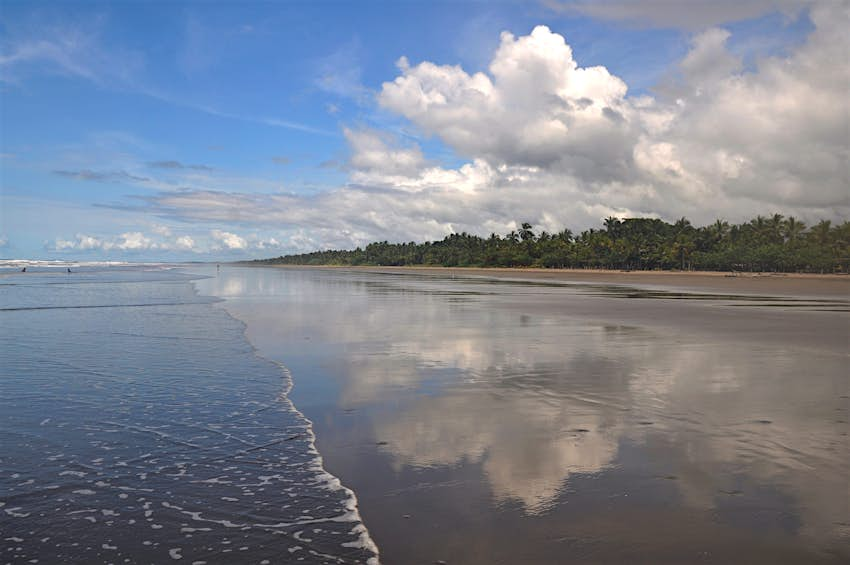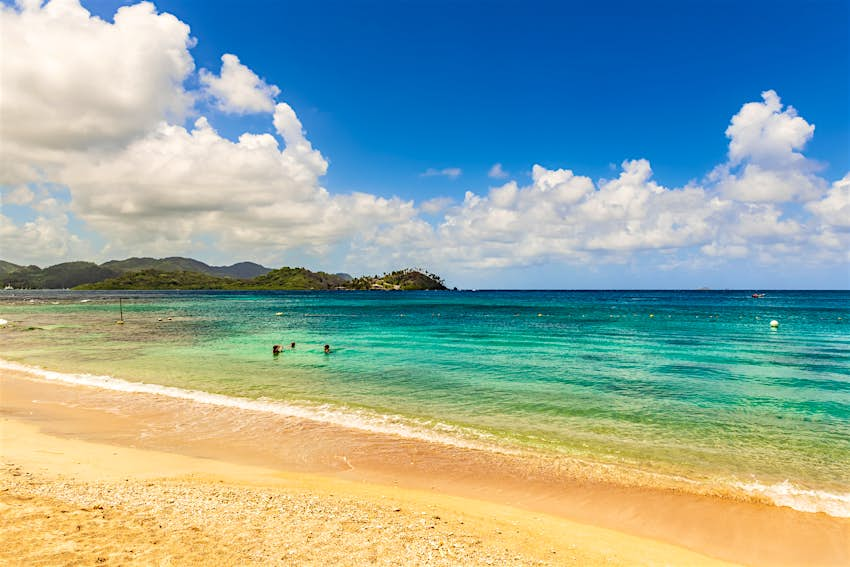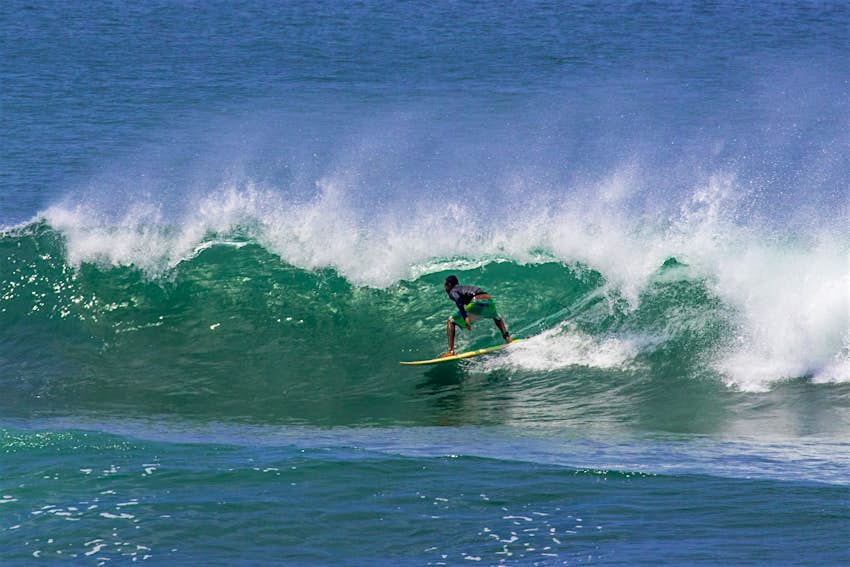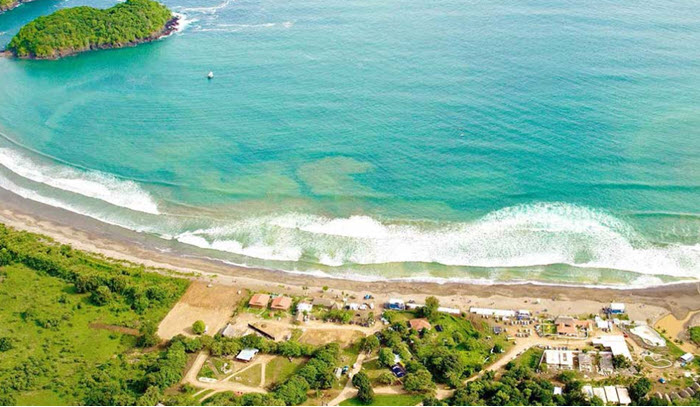bbean vibes on one side and monster Pacific swells on the other, Panama sits poised to deliver the very best of beach life. Whether you’re looking to snorkel over rainbow reefs, ride wicked waves or simply loll on golden sands, there’s something here for every type of beach bum. Here’s our pick of the best beaches in Panama.

Wizard Beach
Although it’s just a 10-minute boat ride from the town of Bocas del Toro, Isla Bastimentos, near the country’s north-western border with Costa Rica, is like a different world. Some travelers say this is their favorite island in their favorite part of Panama. There’s a few beaches to choose from here, but the best could well be the appropriately spellbinding Wizard Beach, awash in powdery yellow sand and backed by thick vine-strewn jungle. It’s connected to Old Bank (the island’s main settlement) via a wilderness path, which normally takes 20 minutes or so but can be virtually impassable after heavy rains.

Playa Las Lajas
One of the longest beaches in Panama, 12km-long palm-fringed Playa Las Lajas, on the country’s southwestern coast, seems to stretch forever. The beach gathers serious crowds at weekends, but during the week it often lies empty, so you can savor the glorious expanse all by yourself. Though not the most popular surf beach in the country, there’s a good beach-bottom break here, with rights and lefts when the waves are up.
Playa Blanca
A decade ago, Farallón was a fishing village with the ruins of the Panamanian military base that was destroyed during the US invasion to oust the then-Military Leader of Panama Manuel Noriega. However, resort fever has recast it, and today the entire stretch of Playa Blanca as one of the hottest (and most beautiful) beach destinations in Panama. Visitors are urged to go beyond the resorts. Much of the original village charm is still here if you wander a little from the shoreline.

Isla Grande
Palm trees and white-sand beaches form the backdrop to this lovely little island, just 15km from Portobelo on the country’s northern coast. A popular getaway for folk fleeing the urban grind of Panama City (which is less than two hours away by car), Isla Grande is an ideal setting for snorkeling, scuba diving or simply soaking up the island’s relaxed vibe. There are no roads, just a footpath along the island’s southern coast, backed by pastel-colored cottages.
Playa Fondeadero
In search of solitude? You are likely to find it at aptly named Playa Muerto (Dead Beach). This coastal settlement on the country’s southeastern shoreline, requires a long, uncomfortable boat ride or arduous two-day trek through the jungle from Sambu to get to. The reward? Up-close views of a genuine Emberá community (an indigenous people of Panama and Colombia), and a host of unspeakably beautiful and unspoiled beaches. Chief among them is Playa Fondeadero, ‘Anchorage Beach.’ It’s located just south of Playa Muerto’s main beach, and is a great spot to swim.

Playa Larga
Isla Contadora (Counting House Island), floating in the Gulf of Panama and connected to the capital by ferry, was once the accounting center for pearls before they were shipped to Spain. In more recent times, multimillionaires have made the island their refuge. However, a government crackdown on tax evasion embittered the previously sweet deal, and now you’ll see many mansions on the island standing vacant. One thing that has never changed throughout the island’s history, however, are the beautiful beaches. Playa Larga (Long Beach) occupies the longest stretch of sand on the island; the only eyesores are a beached ferry and an abandoned hotel behind it. Over the hill to the south and accessible via a well-worn path is Playa de las Suecas (Swedish Women’s Beach), where you can sunbathe in the buff; it’s Panama’s only legal naturist beach.

Playa El Palmar
Starting at the town of Chame and continuing along the Pacific coast for the next 40km or so are dozens of beautiful beaches that are popular weekend retreats for Panama City residents. The lovely, white-sand beach of Playa El Palmar lies 14km southwest of Playa Coronado, near the village of San Carlos. Although much less developed than Coronado, El Palmar is popular with weekending families from the capital, but the atmosphere remains low-key.

Playa Venao
A long, protected beach, Playa Venao – officially Venado but pronounced and spelled as ‘Venao’ – recently transformed from a wild beach on the southern edge of the Península de Azuero to a ‘go-to’ destination. Surfers lay the first claim to its waters; waves are consistent and break in both directions. Depressingly, this gorgeous stretch of blackish volcanic sand looks like a construction site as building continues apace. Venao will hopefully look lovely again when the construction is finished. Surf schools, keen to help newbies with their first wobbly rides, are plentiful here. Good options include Extreme Surf Shop and Surf Dojo.
Refugio de Vida Silvestre Isla Iguana
This 53-hectare reserve is centered on a deserted island in the Gulf of Panama ringed by corals. The water is shallow enough for snorkeling and, as elsewhere in the Pacific, the reef fish here are enormous. Humpback whales also inhabit the waters around Isla Iguana from June to October. You can get here by boat (US$70) in 40 minutes from Playa El Arenal, a beach 3km northeast of Pedasí‘s gas station. Stick to the beaten paths on the island as unexploded ordnance is occasionally discovered here (the US Navy used the island for target practice during WWII).

Santa Catalina
Among Central America’s top surf spots, Santa Catalina has right and left breaks comparable to O’ahu’s Sunset Beach on a good day. Enjoy it while it’s still somewhat remote, undeveloped and home to some seriously wicked surf. Life here is pretty tranquil, in a fishing village where skateboards rip down main street and kids go barefoot but clothing is required to walk to and from the beach. Most non-surfers discover the area as the main springboard for day and overnight trips to Isla de Coiba and its national park, where there’s outstanding scuba diving and snorkeling on offer.
Stay Safe!!
